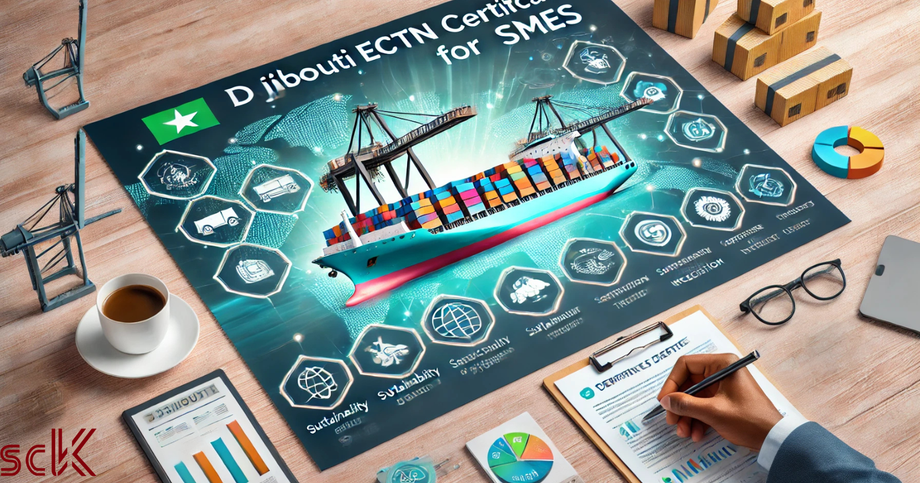
Djibouti, with its strategic location and modern port infrastructure, is one of the key trade hubs in Africa. Positioned in the Horn of Africa, Djibouti serves as a vital logistical gateway for both regional and international trade. The ECTN Certificate (Electronic Cargo Tracking Note) is an essential tool for regulating trade processes and ensuring safer transportation. While it offers numerous advantages in logistics operations, the ECTN Certificate also has a direct impact on trade costs.
This article explores how Djibouti's ECTN Certificate affects trade costs and what these implications mean for businesses.
The Role of the ECTN Certificate in Trade Processes
The Djibouti ECTN Certificate is a digital document that provides traceability for goods from their origin to their destination. For trade conducted thro
ugh Djibouti’s ports, this certificate plays a critical role in streamlining customs and logistics processes. It is not only a legal requirement but also a means of ensuring that trade is conducted securely, quickly, and systematically.
Direct Impacts on Trade Costs
To understand the impact of Djibouti’s ECTN Certificate on trade costs, several key factors must be considered:
1. Certification Fees
The ECTN Certificate is issued at a cost that depends on the type, quantity, and value of the cargo being transported. These fees are a component of overall trade expenses.
- Impact:
While certification fees may pose a significant cost, particularly for small and medium-sized enterprises (SMEs), they ensure the orderly and transparent transportation of goods, offering long-term benefits for trade security.
2. Savings in Customs Procedures
The ECTN Certificate enables pre-clearance of cargo details, expediting customs processes at Djibouti’s ports.
- Impact:
Reduced processing times lower port storage fees and minimize delays, resulting in cost savings.
3. Mitigating Logistical Risks
By providing detailed tracking of goods, the certificate reduces the risks of loss, damage, or theft during transportation.
- Impact:
Lower risks translate to reduced insurance costs and fewer disruptions in the supply chain.
4. Transparency and Trade Confidence
The ECTN Certificate promotes transparency in trade processes and prevents issues such as incomplete or fraudulent documentation.
- Impact:
Improved transparency reduces trade disputes and the likelihood of penalties, indirectly saving costs.
Indirect Cost Implications
In addition to direct costs, the ECTN Certificate impacts trade expenses through enhanced efficiency in trade processes:
1. Increased Speed of Trade
Djibouti’s ports are among the most modern in Africa. Combined with the ECTN Certificate, this infrastructure facilitates faster loading and unloading of goods.
- Impact:
Faster processes improve on-time delivery rates and enhance customer satisfaction.
2. Strengthening Regional Trade
The ECTN Certificate reinforces Djibouti’s role as a regional transit hub. Enhanced regional trade efficiency allows businesses to access broader markets.
- Impact:
Expanded market access can boost revenues and reduce long-term operational costs.
3. Encouraging Technological Investments
The ECTN Certificate contributes to the digitalization of trade processes in Djibouti. This reduces operational errors and enhances efficiency.
- Impact:
Investments in digital systems may seem costly initially but lead to more sustainable trade operations over time.
Strategies to Reduce Trade Costs
Businesses can optimize costs related to Djibouti’s ECTN Certificate by adopting the following strategies:
-
Work with Authorized Agents:
Applying for the certificate through experienced and authorized agents ensures faster processing and avoids additional expenses. -
Invest in Digital Processes:
Effectively managing the ECTN Certificate through digital platforms reduces delays and errors caused by manual processes. -
Plan Trade Operations Efficiently:
Advanced planning of trade and logistics operations minimizes port fees and waiting times, cutting costs.
The Djibouti ECTN Certificate is not just a regulatory requirement but also a tool that enables trade processes to be managed more systematically, transparently, and securely. While its costs may appear burdensome in the short term, the certificate enhances trade efficiency in the long run, offering economic advantages for businesses.
By effectively managing ECTN Certificate processes, companies can optimize their costs and fully leverage the trade opportunities Djibouti offers. With its modern port infrastructure and trade regulations, Djibouti continues to solidify its position as a strategic player in regional and international trade.
